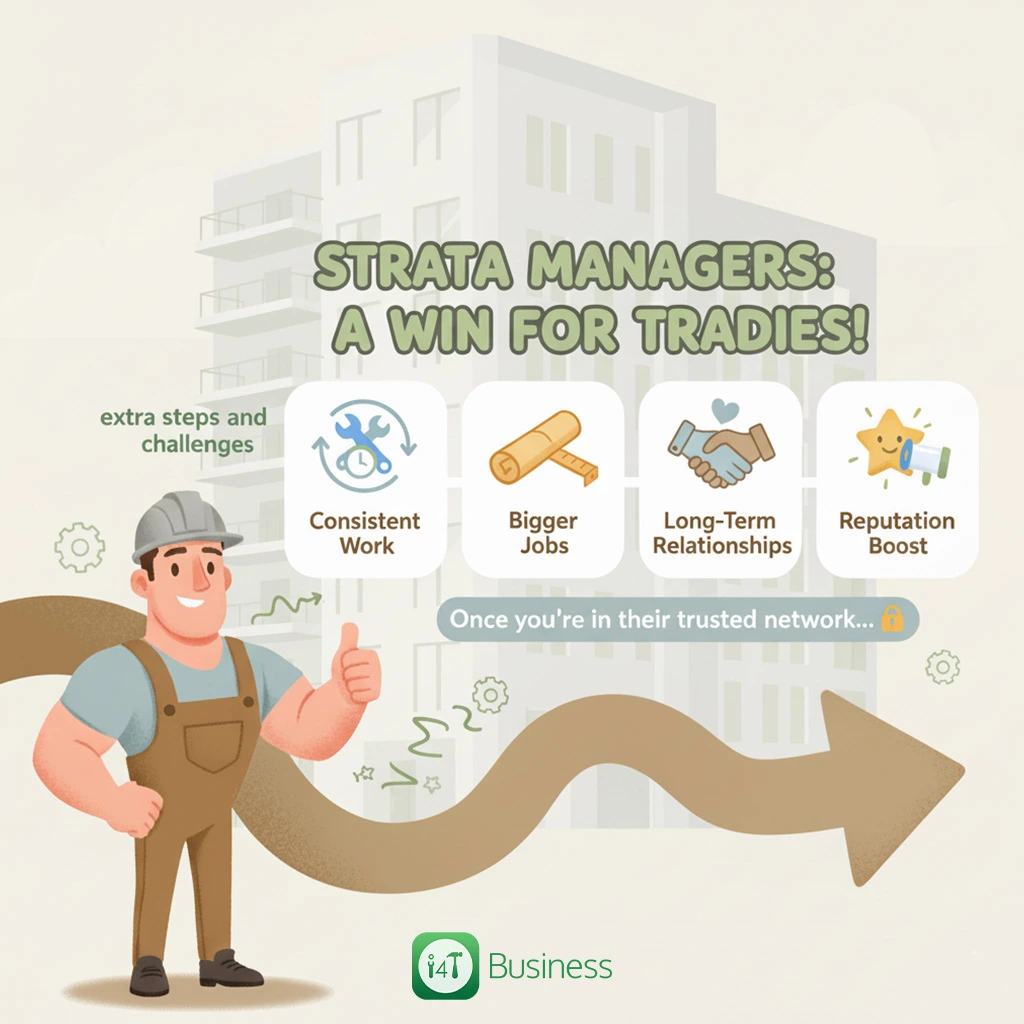If you’ve ever worked on apartment blocks, townhouse complexes, or shared commercial spaces, chances are you’ve crossed paths with a strata manager. They’re the ones keeping the whole show running behind the scenes, making sure common areas stay safe, repairs get done on time, and residents aren’t left waiting too long when something breaks.
For tradies, this can be a solid source of ongoing property maintenance work. But working with strata managers isn’t quite the same as doing a job for a single homeowner. There are more people involved, more boxes to tick, and sometimes a few extra steps before the job even starts.
This guide breaks down what tradies can expect when working with strata managers, the type of work that usually comes through, and how to set yourself up to win repeat jobs. Whether you’re a plumber, sparky, chippy, or locksmith, understanding how strata managers operate will make life easier and your business busier.
Who Are Strata Managers and What Do They Do?
A lot of tradies hear the term “strata manager” and think they’re just another type of property manager. Close, but not quite. A property manager usually looks after one rental property on behalf of a landlord. A strata manager, on the other hand, looks after an entire building or complex that’s split into lots, like apartments, townhouses, or commercial suites.
Their job is to keep everything that’s shared in good nick. Think driveways, stairwells, lifts, roofs, gardens, pools, and carparks. They also make sure the building meets safety and compliance standards, from smoke alarms to electrical checks. On top of that, they handle the admin side, budgets, insurance, meetings, and communicating with owners and tenants.
In short, they’re the go-between for the owners’ committee (also called the owners corporation) and everyone else who helps keep the property running smoothly, including you, the tradie.
For tradies, that means when something needs fixing, upgrading, or maintaining in the shared areas, the call usually comes from a strata manager.
How Do Strata Managers Hire Tradies?
Strata managers don’t usually just pick the first tradie they find on Google. There’s a bit of a process involved, and it often depends on the size of the job and the rules of the owners’ corporation.
For smaller maintenance tasks, say fixing a lock or clearing a blocked drain, a strata manager might call up a tradie they already trust to get it sorted quickly. For bigger jobs, they’ll often need to collect a few quotes, run them past the committee, and wait for approval before giving the green light. That means patience is key, because decisions can take longer than with a private homeowner.
Most strata managers also prefer to stick with tradies who are “on the books” as approved contractors. To get there, you’ll usually need to provide up-to-date licences, insurance, ABN details, and sometimes even proof of training like working-at-heights or safety induction cards. Having all that paperwork ready to go shows you’re professional and makes it easier for them to say yes.
So if you’re keen to win strata work, being reliable, responsive, and compliance-ready goes a long way. Once you’re in their good books, you’ll often get repeat calls whenever something needs fixing.
What jobs do tradies do for strata managers?
Working with strata managers means you’ll see a pretty wide variety of jobs, depending on the property. Some days it’s quick fixes, other days it’s bigger maintenance projects.
Here are some of the most common call-outs:
- Plumbers – burst pipes, blocked drains, leaking taps in common bathrooms, or hot water system issues.
- Electricians – safety checks, faulty lighting in stairwells, switchboard upgrades, or emergency call-outs when the power trips.
- Locksmiths – repairing or replacing locks on shared doors, garages, or security gates.
- Cleaners & gardeners – keeping common areas tidy, lawns mowed, bins sorted, and paths clear.
- Painters & handymen – touching up walls, fixing fences, or giving a fresh coat of paint to shared areas.
You’ll also come across emergency jobs, like leaks, power outages, or a broken security door that needs attention straight away. These are often after-hours and can be a good way to show reliability (and sometimes earn a bit of extra pay).
Then there’s scheduled maintenance, which might include things like annual fire safety checks, roof inspections, or lift servicing. These jobs are usually planned in advance and can give you steady work if you build a good relationship with the strata manager.
At the end of the day, if it keeps a building safe, compliant, and comfortable for residents, there’s a good chance a strata manager will need a tradie like you to get it done.
How should tradies communicate with and report to strata managers?
One of the biggest differences between working for a homeowner and working for a strata manager is the paper trail. It’s not just about rocking up, fixing the problem, and sending an invoice. Strata managers need to keep owners and committees in the loop, so they rely on you to provide clear updates and proper documentation.
Here’s what they usually expect:
- Job updates: A quick call, text, or email to let them know when the job’s booked, when you’re on site, and when it’s finished.
- Reports and photos: After completing a job, strata managers often need a short written report with photos to show the committee what was done (and prove the money was well spent).
- Certificates and compliance docs: For certain trades, like electrical, plumbing, or fire safety, you may need to issue certificates. Having them ready and delivered on time makes the strata manager’s life easier.
- Professional conduct: Remember you’re often dealing with not just the manager, but also tenants and owners in the building. A friendly attitude and clear communication go a long way.
Think of it this way: strata managers juggle dozens of jobs across multiple buildings. The tradies who keep things simple, reliable, and easy to report on are the ones who get called back.
How do tradies get paid by strata managers?
When you’re working with strata managers, it pays (literally) to understand how the money side works. Unlike a private job where you might get paid straight after the invoice lands, strata work can take a bit longer.
Here’s what you can expect:
- Quotes up front: For most jobs, especially anything above a few hundred bucks, strata managers will ask for a written quote. Detailed quotes with clear pricing and scope of work help them get quicker approvals from the committee.
- Payment timelines: Once the job’s approved and finished, your invoice goes through the strata office, then usually to the owners’ corporation for processing. It’s not uncommon for payments to take 14-30 days (sometimes longer if a committee only meets once a month).
- Paperwork matters: Always include your ABN, insurance details, and any compliance requirements on quotes and invoices. Missing details can cause delays in payment.
- Cash flow planning: Because of the approval and payment cycle, it’s smart to factor in a bit of a wait. Reliable tradies often build this into their workflow so they’re not left short while waiting for funds to clear.
It might not be as fast as dealing with a homeowner, but once you’re set up properly, strata jobs can provide a steady stream of income. Being organised with your paperwork is half the battle.
What are the Challenges of Working with Strata Managers?
Working with strata managers can be rewarding, but it’s not always smooth sailing. Compared to private jobs, there are a few extra hoops to jump through. Knowing what to expect up front makes the whole process less frustrating.
Some of the common challenges include:
- More people involved: Instead of just dealing with one homeowner, you might have a strata manager, an owners committee, and tenants all in the mix. Everyone has an opinion, and decisions can take time.
- Approval delays: Even small jobs sometimes need sign-off from a committee. That means your quote could sit on the table until the next meeting before you get the go-ahead.
- Extra compliance: Strata work often comes with stricter safety and insurance requirements. If your paperwork isn’t up to date, you could miss out on jobs.
- Communication overload: With so many stakeholders, you may find yourself repeating the same updates to different people. It’s all part of keeping everyone on the same page.
The key is patience and professionalism. Tradies who can roll with the slower pace, keep their documents in order, and stay friendly under pressure tend to win the trust of strata managers, and that usually leads to more regular work.
Is it worth working with strata managers?

While there are a few extra steps and challenges, working with strata managers can be a real win for tradies who stick with it. Once you’re in their trusted network, the benefits start to add up:
- Consistent work: Apartment blocks, townhouse complexes, and shared buildings always need ongoing maintenance. Once you’re on a strata manager’s radar, you can become their go-to tradie whenever something pops up.
- Bigger jobs: Unlike small one-off fixes for homeowners, strata work can include large-scale projects like repainting whole complexes, upgrading lighting systems, or repairing shared roofs. Those jobs mean bigger invoices and better use of your time.
- Long-term relationships: A good relationship with a strata manager can last years, leading to a steady pipeline of jobs. If they know you’re reliable and professional, you’ll be top of mind for future work.
- Reputation boost: Being able to say you regularly service strata properties adds credibility to your business. It shows you can handle compliance, reporting, and bigger-scale projects.
At the end of the day, strata managers value tradies who make their lives easier. If you can deliver quality work, keep the paperwork tidy, and communicate well, you’ll likely enjoy steady, rewarding work that keeps your calendar full.
How can tradies get more work from strata managers?
Getting your foot in the door with a strata manager is one thing. Staying in their good books so they keep calling you back is where the real value lies. Here are a few simple tips that make a big difference:
- Be quick to respond: Strata managers juggle dozens of properties. If you’re the tradie who replies fast, you’re more likely to get the job.
- Keep your documents up to date: Insurance certificates, licences, ABN; have them ready to go. Nothing slows things down like chasing missing paperwork.
- Send clear reports and photos: A quick job summary with before-and-after pics saves the manager explaining it to the committee. You’ve just made their job easier.
- Turn up when you say you will: Sounds simple, but reliability is gold in this industry. If you commit, deliver.
- Stay professional on site: You’re often dealing with residents and owners. A friendly, respectful approach reflects well on both you and the manager.
- Use the right tools to stay organised: Job management software can help you track quotes, schedule jobs, send invoices, and store compliance docs in one place, making you look like a pro and saving you admin headaches.
Strata managers notice the tradies who keep things smooth and stress-free. Nail these habits, and you’ll not only get more work but also build long-term partnerships that keep paying off.
Conclusion
Working with strata managers isn’t quite the same as working with a homeowner. There are more people involved, more paperwork, and sometimes longer waits for approval and payment. But for tradies who are organised, reliable, and professional, it can be a steady source of rewarding work, with bigger jobs and long-term relationships up for grabs.
The key is to make life easier for the strata manager: respond quickly, keep your compliance docs ready, communicate clearly, and deliver quality work every time. Do that, and you’ll be the tradie they keep calling back.
If you want to take it a step further, using a job management system like i4T Business can help you stay on top of quotes, invoices, compliance paperwork, and communication, all in one place. It’s a simple way to look more professional, save time on admin, and connect with more strata managers who need reliable tradies.
FAQs
A strata manager oversees the shared areas of apartment blocks, townhouse complexes, or commercial buildings. They handle maintenance, compliance, budgets, and communication between owners and residents, and they rely on tradies to keep everything running smoothly.
Most strata managers prefer using approved tradies with up-to-date licences, insurance, and ABN details. Reach out with your documents ready, respond quickly to enquiries, and build trust through reliability and professional communication.
Payment can take a little longer than private work, usually anywhere from 14 to 30 days (sometimes more if a committee approval is needed). Clear invoices with all required details help avoid delays.
Common trades include plumbers, electricians, locksmiths, cleaners, gardeners, painters, and fire safety specialists. Jobs can range from quick repairs and emergency call-outs to scheduled maintenance and major upgrades.
Yes. While there can be extra steps and paperwork, strata work often brings consistent jobs, larger projects, and long-term relationships. Once you’re trusted, it can become a steady source of reliable income.
Hot off the press!

Maintenance Schedule
| Frequency | Tasks |
|---|---|
| Daily / Weekly |
- Cleaning lobbies, hallways, stairwells, and bins. - Checking lighting in common areas. - Pool and spa cleaning and chemical checks. - Garden watering and tidying. |
| Monthly |
- Testing fire alarms and emergency lighting. - Inspecting lifts and escalators. - Pest control checks (where needed). - Reviewing security systems (CCTV, intercoms, access gates). |
| Quarterly |
- Gutter and downpipe cleaning (more often in leafy areas). - Plumbing checks for leaks and blockages. - Ventilation system servicing. - Health and safety hazard inspections (trip hazards, handrails, signage). |
| Bi-Annually |
- Full roof inspection for leaks or damage. - Stormwater drain cleaning. - Asbestos management checks (if applicable). - Full pest control treatment. |
| Annually |
- Fire safety compliance inspection and certification. - Electrical switchboard and RCD testing. - Hot water and heating/cooling system servicing. - Full garden landscaping and tree trimming. - Review and update of the maintenance checklist itself. |
console.log( 'Code is Poetry' );










